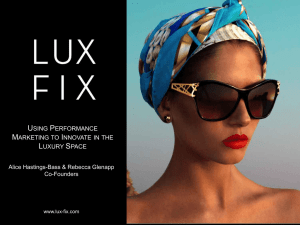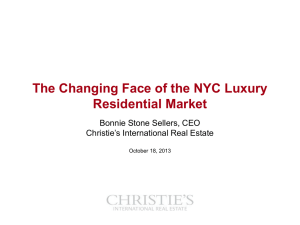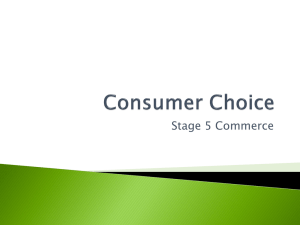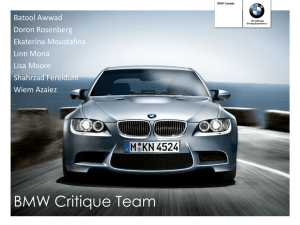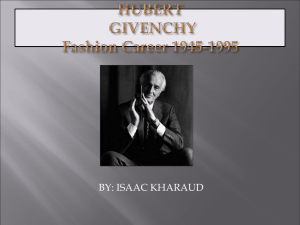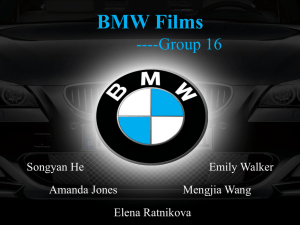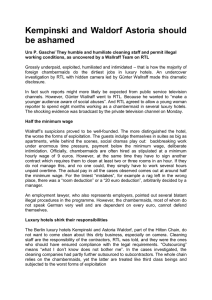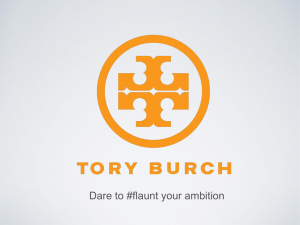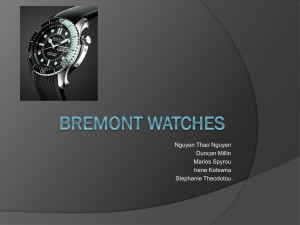Grainy_LVMH
advertisement
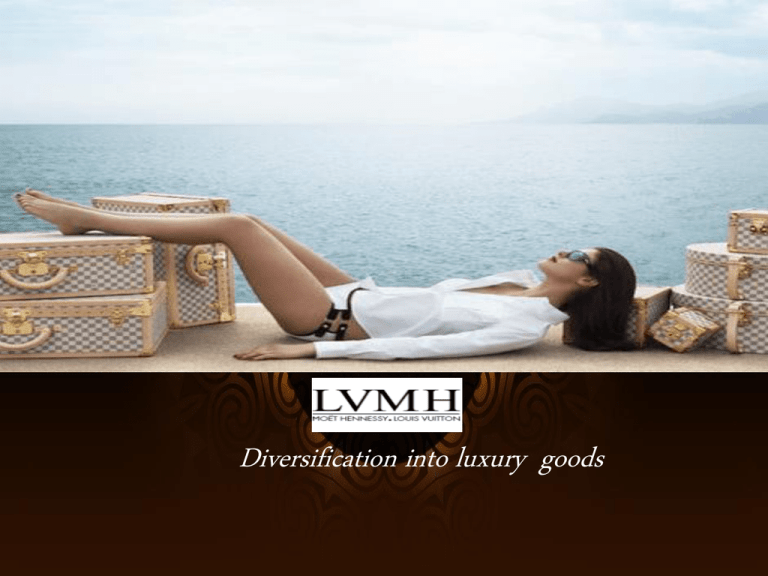
Diversification into luxury goods Agenda • Luxury Industry • Moet Hennessy Louis Vuitton - LVMH • SWOT • Competitor Analysis • Short& long Recommendations Luxury Goods Industry What is Luxury? Luxury Goods Industry – History Luxury Goods Industry – Current What is Luxury? Definitions… If everyone owns a particular brand… by definition it is not luxury Luxury is associated with high price, or high quality Luxury is about the quantity of expensive goods Luxury is derived from unique craftsmanship & technical superiority Luxury is to project certain social status or wealth Luxury is to satisfy an emotional desire for subjective intangible products Luxury Goods Industry - History • 18th Century – viewed as the beginning of luxury history in Europe • For centuries, luxury goods industry which has been controlled by the family business provides services to the most affluent sectors of society • In recent years, for the wave of acquisitions, most of these family-run enterprises were merged by the Commercial giant Luxury Goods Industry – Global • Before the 1990s Global luxury industry kept 10% -20% of the unconventional speed development, and created a 250 billion US dollars on the global market • 2000, the industry began to turn constantly troughs period • Since 2000, the global luxury goods market in a state of contraction • 2004 luxury industry profit has declined 35.7%. • 2006 Global sales of luxury goods rose 10 percent to a record 150 billion Luxury Goods Industry - Current • Consumer consumption rates – based on global market share luxury goods market share in the global distribution 14% 41% 12% 16% 17% Japan America Europe China Others The Group is active in 5 Sectors Perfumes & Cosmetics Watches & Jewelry Fashion& Leather Goods Selective retailing Wine & Spirits 1743 1743 1854 1743 1854 1860 1743 1854 1860 1947 1743 1854 1860 1947 1961 Bernard Arnault + 1987= LV L = > 64,000 6 employees 1,700 = >stores + = + > 60 Prestigious brand + = +TODAY worldwide >$ 17 billion US Revenue + Future =? Swot Analysis Strength • -Powerful and prestigious brand portfolio • -World renowned • -Powerful distribution capabilities • -New product launches • Wines and spirits Moët & Chandon; Hennessy; Louis Vuitton, Kenzo, Givenchy, Fend Christian Dior, Guerlain, Parfums Givenchy Dior, Fred, Omas, TAG Heuer DFS Galleria, Miami Cruiseline Services, Sephora, Le Bon Marché Weaknesses • -Selective Retailing division continued poor performance • -Higher exposure to US Dollar than its peers • -Weak sales performance Opportunities • • • • -A change in investor’s perception -Expansion into new countries -Product diversification -Advertising impact Threats • • • • -Champagne production -Price deflation -Economic cycle -Imitators Swot Analysis Strength • -Powerful and prestigious brand portfolio • -World renowned • -Powerful distribution capabilities • -New product launches • Wines and spirits Moët & Chandon; Hennessy; Louis Vuitton, Kenzo, Givenchy, Fend Christian Dior, Guerlain, Parfums Givenchy Dior, Fred, Omas, TAG Heuer DFS Galleria, Miami Cruiseline Services, Sephora, Le Bon Marché Weaknesses • -Selective Retailing division continued poor performance • -Higher exposure to US Dollar than its peers • -Weak sales performance Opportunities • • • • -A change in investor’s perception -Expansion into new countries -Product diversification -Advertising impact Threats • • • • -Champagne production -Price deflation -Economic cycle -Imitators Competitor • Remy Cointreau • PPR ( Pinault-Printermps-Redoute) • Prada • Richemont Remy Cointreau • Founded: Merger of Remy Martin(1724) and Cointreau(1849), France, 1991 • Products: cognac, wines, rums, liqueurs, champagnes • Sales (mil.) in 2006: $963.9 • Net income (mil.) in 2006: $89.2 • Employees: 1346 Advantage • Customer loyalty • The decision to regain control of worldwide distribution • Increase brand awareness and market leadership PPR(Pinault-PrintempsRedoute) • • • • • Founded: Francois Pinault, France, 1963 Sales in 2006 ( mil. ): $23,656.2 Net income in 2006 ( mil.) : $965.9 One year net income growth : 42.2% Employee in 2006 : 78,453 Gucci • Subsidiary of PPR • Founded: Goccio Gucci, Italy, 1921 • Products: cosmetics, shoes, perfumes, Leather fashions, watches Advantage • Marketing strategy • Strategic deployment • Designer Prada • Founded: Mario Prada, Italy, 1913 • Products: costumes, hand bags, suitcases, watches, perfumes • Company type: private Advantage • Designer • Marketing strategy • Brand strategy Richemont • Founded: Anton Rupert, Switzerland, 1988 • Products: jewelry, watches, leather goods, pens • Sales in 2006 ( mil.) : $ 5,201.9 • Net income in 2006 ( mil.) : $1,323.4 • Employee: 16,400 Short Recommendation • Customer Service – providing better service to customers to keep them • Company growth – serving consumers (i.e. starbucks) Long-term Recommendation • Piracy & counterfeit – competition between the real and fake products Long-term Recommendation • Focus On Potential Market (i.e. Asia Market) luxury goods market share in the global distribution 14% 41% 12% 16% 17% Japan America Europe China Others

